Sonia Paul
Hello, everyone, welcome to Loitering, the occasional but lovable traveling mini pod I am currently testing in newsletter format. And today I am loitering on the phone with a very special guest. Can you please introduce yourself?
Rachel Monroe 00:26
Hi, this is Rachel Monroe. I am a writer and I'm stoked to be talking to you today.
Sonia Paul 00:32
So you're a writer, where are you based?
Rachel Monroe 00:35
I am based in Marfa, Texas. It's a small town of about 2000 people that is in far West Texas. So that means it's about 200 miles east of El Paso and about 70 miles north of the Mexican border. And it gets most of its attention for minimalist art, and it's just a small place in the middle of the desert with a great creative community.
Sonia Paul 00:59
Interesting, and how long have you been living there?
Rachel Monroe 01:02
Since 2012.
Sonia Paul 01:04
Okay, so can you talk a little bit about the kind of writing that you do, the kinds of stories that you pursue?
Rachel Monroe 01:11
Sure. I always have a hard time kind of identifying myself as a journalist, I guess, which is in some ways, like maybe the easiest way to say what I do, I write magazine pictures, mostly. But, you know, I didn't go to journalism school or anything. So I don't know. I just I tend to like writing about people in complicated multi layered situations and can manifest in a lot of different ways. And I write a lot about crime, but not exclusively about it.
Sonia Paul 01:39
Right. Yeah, so you wrote a book recently called Savage Appetites: Four True Stories of Women, Crime and Obsession. Can you talk a little bit about the genesis of that book and where the idea came from?
Rachel Monroe 01:53
Sure. It really started with my own curiosity about myself, actually. I tend think of myself as a pretty friendly, nice, good tempered person, nonviolent. But I've always been really drawn to these true crime stories, stories of just really terrible things that people do to each other, even from a very young age, from a sort of alarmingly young age. And then, over the years as I became a writer and a journalist and did some reporting myself, and wrote some pieces that could be considered true crime. It was interesting to me that that didn't quite fill the fascination. In certain moods, in certain parts of my life, particularly, when I had a hard day, or having just a difficult period, all I would want to do is come home and zone out — it always felt like zoning out — while listening to or watching or reading a story about just like extremely awful human experiences. There's some contrast there between the pleasure and almost relaxation that I got and the content of what I was reading about, just like real human tragedy. There is a disconnect there, that I knew a lot of people felt it. So it seemed to me that there was something to dig into. I wasn't finding anybody at the time who was able to articulate what was going on in a way that satisfies me. So I thought I would have to dig into it myself.
Sonia Paul 03:19
Wow. And what generation are you?
Rachel Monroe 03:24
Haha, I'm an old millennial.
Sonia Paul 03:26
No, the reason I ask is because true crime and like the sort of obsession that we in the US in particular have with it has kind of like really ascending in the last few years, I would say, especially, like, you know, the podcast Serial, or all these other true crime podcasts. I don't know what else you're thinking of. But I remember when I was growing up too though, like I used to watch Unsolved Mysteries with Robert Stack all the time. And I'm wondering then this idea of obsession with true crime. I mean, is it that it's become more common, or has it always been there but all the sudden we're more fascinated with it? And what are the forces that are making us more fascinated with it, you think?
Rachel Monroe 04:11
Yeah, I mean, I think you're right that it is something that has existed. And so they have always drawn an audience from the very beginning of mass media, people were telling murder stories. But, at the same time, I think it's really clear that we're having a cultural boom moment. And these moments, they ebb and they flow. And it's really like clear that something is happening. And also, I think, for different reasons, the crime world, sometimes it's more like a subculture thing. I think when I was growing up, at least that's what I thought about it as. It felt kind of, like an edgy thing for people who are, you know, dressed in black and really gloomy or something -- at least that's the association I had. And I remember when I went to Crime Con, which is essentially a true crime fan convention put on by the TV network Oxygen, a couple years ago, it was so clearly a mainstream audience that they were targeting, or at least that they were attracting. And so I think that idea that this is no longer like fringe culture, alternative culture, but it's like truly, truly mainstream, that's the thing that isn't always the case, that these are the stories at the forefront of our culture.
05:15
And I think there are a lot of things that attribute to that. I mean, in large part I think, just the growth of podcasts as medium is a huge driver, because in many cases, people aren't necessarily breaking new ground with their true crime podcasts. They're telling these old stories, sometimes like real familiar stories in this new format. That gives these stories that have already been told a new kind of life, a new energy, because they're being told in this way. And so, clearly, there's things that go beyond the podcast realm and the realm of cable TV networks, and books and Netflix shows and documentaries, and magazine journalism, and it's everywhere. But the growth of the podcast and the way that these stories, with their drama and their hooks and their sense of an unfolding investigation, really are suited to the podcast world.
Sonia Paul 06:04
Interesting. And you mentioned when you went to this Crime Con convention, it was sponsored by Oxygen, which is this women's network. And if I remember correctly from reading the book, it was mostly women who were attending that conference, right?
Rachel Monroe 06:19
Oh, yeah, like overwhelmingly like 80-90% women, for sure.
Sonia Paul 06:23
So what is it about women and crime that you started to probe and that you kind of figured out through the course of your reporting and writing this book?
Rachel Monroe 06:32
It's interesting, right? Because when we look at crime, statistically, you would think that it would be something that would just be a field that draws like a primarily male audience, because most murderers are men. Most who are are victims are also men. The people who are working in this world as homicide detectives, as defense attorneys, all those professions are primarily male. Sometimes overwhelmingly so. But you're right that the audience for these stories is really disproportionately female, and I think there are a lot of reasons contributing to that, you know, every now and then you'll find somebody who wants to give one small pat answer to why women are so drawn to true crime. And those answers never feel satisfying. It's a multi-layered thing.
But I think, I guess the simplest way that I could put it would be that women have a really fraught and complex relationship with our own vulnerability. We, I think, are socialized to be really aware of our vulnerability in the world. And some of that comes from culture, you know, the fact that our culture is also really preoccupied with female vulnerability, and, and not in a universal way, right, like the vulnerability of attractive middle class white women, often young white women, is something that you see so many shows or plot points revolving around. The writer Alice Bolin wrote a great book called Dead Girls, and she talks about how much of our pop culture, the jumping off point is the discovery of this, you know, beautiful blonde woman, dead body. And that's, that's kind of the role for her and like, how could this happen and that sets off of the plot points that follow.
And so I think growing up in a culture with this heightened awareness of vulnerability, both in our daily lives and in the culture that we consume gives women, people socialized as women really, complex feelings. And true crime is a way to, I think, kind of dip a toe into those waters, splash around, think about it, but not think about it necessarily too hard. It acknowledges that anxiety and the risk of violence out there in the world, but at the same time, it has this proving function, particularly the more formulaic kinds of true crime where the viewer or listener is given that kind of reassuring message, you know, where you stand, you can easily identify the bad guy. Often the bad guy -- it's one singular person, right? It's not like a systemic issue. It's, it's one bad person. And then if you remove the one bad person, order is restored. So it both acknowledges these anxieties and fears about vulnerability. And then assuages them, at least a little bit, even if it's not fully a complete or honest or satisfying way. I think that's what a lot of the appeal comes from.
Sonia Paul 09:25
Yeah. Wow. That actually brings me to another question I had. So the way you structured your book was to divide it into different sections. The detective, the victim, the defender, and the killer. And I actually wanted to talk to you more about the persona of the victim and this idea of victimhood, because you do note that most victims tend to be women, but also bad when a woman is a victim, it is kind of the only true way she can have a voice or at least speak with a voice that has an authority. And just like, before you answer that question, I wanted to read a couple of excerpts from your book where you talk about this. Because there were some passages that really, that really like stood out to me.
So this one is on page 78. "The victim is in some ways, the central character of any true crime account. Without her there would be no story, but she also has the disadvantage of being dead. In many cases, though, hers is the only major role available to women." And then you continue on to write, "So even as some victims are blamed or debased, others are afforded a kind of wounded authority, or an authority rooted in their wounds." Can you talk a little bit more about this "wounded authority"?
Rachel Monroe 10:53
Sure, and I just wanted to note something that you said earlier, most murder victims are not women. Most murder victims are men. Most murder victims are like, young black men.
Sonia Paul 11:04
Yes!
Rachel Monroe 11:05
You know, but those are not the victims that our culture considers as victims, or talks about or like, it's just like so. And we have such a distorted picture of who is the victim of violence in our culture.
Sonia Paul 11:17
Totally. The victim in a story though, especially like a novel, I feel like I've read a little bit about this, though, that it does tend to be like women, predominantly white women.
Rachel Monroe 11:27
Totally. Exactly. So yeah, there's that huge — just wanted to like mark that disconnect.
Sonia Paul 11:31
Yeah.
Rachel Monroe 11:31
I mean, especially we're talking about something that, a genre that describes itself as "true," right? Noting, like calling attention to that disconnect seems really important. And also that women of color, Native women, have like much higher rates of victimization than white women, but again, like are not, not the ones who are at the forefront, usually, of our narrative.
11:53
And so, thinking about that wounded authority. It's — it is really tricky to work my way through this idea of the trope of the victim in true crime narrative because that's a role that cuts both ways, right? Being a victim is of course, a role that's defined by some level of harm that's been done to that person. Harm, it's defined by vulnerability. And at the same time, the victim is allowed to speak. In some cases, the victim is like allowed a kind of authority to speak to say what happened to her. I mean, I think we have seen this a lot in recent areas when — this is not always the case, but that victims voices are kind of held up or uplifted or given a pride of place. But of course, part of what I was trying to get at is that it's only certain victims who are given, afforded that kind of authority. And I talk a lot in that section about this rhetorical category of the "innocent victim," which is a phrase that comes up a lot during the victim's rights era, during the Reagan era, when a lot of these laws which later lead to mass incarceration are passed, and they're often passed under this banner of protecting victims. But again, it's not protecting all victims or most victims, it's protecting this special category of the "innocent victim." And I guess the innocent victim is supposed to be someone who is, you know, assaulted in some way, preyed upon by a stranger, did nothing wrong, and just had this terrible fate imposed on them. But of course, this is sort of an imaginary category that we have made up. There's like such little resemblance to the way that people are actually victimized in the real world. Victims and perpetrators often know each other, have some form of relationship, or victims and perpetrators tend to be from the same communities. There's a huge amount of overlap there. And there's also of course, like so much coded language in that idea of who does our culture, who does our society see as innocent? Who do we assume is innocent and who? I mean, I guess the corollary of the "innocent victim" right, is like the "guilty victim," or the victim who is somehow to blame? And there's so much like racial and class and other kinds of coding that feed into who is allowed to occupy those roles.
I was on a panel with a great writer the other day. We were talking about this very issue, like who is afforded that status of victim and how it is at once like kind of dignity to have your victimization recognized? Because like, we're saying, like, so many people are not seen as a victim. But then at the same time, there's also like the stigma of victimization. And so it's such a hard thing to write about, because there are those dual functions going on at all times. But I think it's really important to pay attention to both sides of that. Both the dignity and stigma of being recognized as a victim.
Sonia Paul
Yeah, and it's also like striking to me, because I also feel that at the same time there is a dignity and a stigma to being a victim, there's also often a reframing that comes from maybe the victim themselves, of being a "survivor." And so what does it necessarily mean to then take on the label of "survivor" as opposed to "victim"? Especially since sometimes I think like, you know, we can offhandedly say to people who are kind of like, you know, like lingering in their sadness, like, "Oh, stop playing the role of the victim," or like, it's like, "victimization mentality." I mean, it's like, it's a negative connotation when we say those things. So yeah. Do you have any thoughts on that?
Rachel Monroe 15:38
Yeah, that's something that you hear a lot is people wanting to kind of shift that identifier, I guess, away from the act that was perpetrated against them to their own...what happens afterwards, right? Like the victim versus survivor, you've got these different connotations of strength, of moving on, of kind of looking forward? And that's something that different people feel different attachments to. What is right language to use, what is the best, most empowering language to use, whether calling somebody a survivor is, is it minimizing? Is it empowering? There's like, I think more debate in the community. And so, because I was writing so much about the political ripples of the victims rights movement, it seems to me it's important to kind of dig into that idea of the language and the connotations around the idea of "victim" as a word.
Sonia Paul 16:36
Yeah. Yeah. I mean, I feel like this really coincided with a cultural moment too. I mean, like true crime aside, I mean, with the whole Me Too movement and the fact that women have been victims of sexual violence for years on end, and this is only finally getting recognized now. I mean, there's a lot to say.
Rachel Monroe 16:58
I think that's certainly another reason that people — particularly women are drawn to true crime — is that it brings up these questions of power and exploitation and harm, and often in this very extreme context of, you know, like serial killers and kidnappers and murderers. But it is acknowledging the power differentials, often ones that don't benefit women. And so I think that at this time when we're having all these conversations about less, maybe like less overt or less violent or less, you know, deadly harms perpetrated against women, these stories really show things in this harsh, intense light — can have a sort of satisfaction, you know? I mean, it's funny, I remember listening to a really terrible YouTube videos. I mean, the YouTube videos are fine but the content is what's terrible. These two men and now I'm going to forget their names. Fortunately. They were serial killers, they worked as a pair they killed lots of women and you can hear some of their interrogation. But, after they were caught —
Sonia Paul 18:03
Wait, wait. Sorry, this was their own YouTube channel video?
Rachel Monroe 18:10
Somebody, whoever the investigator was, interviewing them, and then it later got released. I don't know, through open records act or — I don't remember the provenance. But the way that they talk about their victims is like so awful and disgusting and demeaning and debasing. And then I was wondering, I was like, why am I watching this? Like, what satisfaction am I getting out of this? And the best explanation I could find for myself, at least was, there was a kind of perverse satisfaction in hearing misogyny, so overtly displayed, if that makes sense. I was like, "Yeah, see, like, that's what it is. I know it out there in the world. I feel it in these kind of fainter, shadowy sorts of ways." Most people are like better at hiding it. Maybe don't feel it as virulently. But hearing these men talk about how much they hate women. I was like, "Yeah, see, I knew it. I knew it." Yeah, I mean, all I can describe it as is like the total perverse satisfaction, almost like a kind of confirmation. And I wonder if that's part of what is driving particularly women right now to these stories.
Sonia Paul 19:16
Yeah, like the satisfaction of hearing your own experiences and what you've observed for so long being actualized by others, who are not necessarily women.
Rachel Monroe 19:27
And in this completely extreme way. You know, it was very far from my own experience, but I could see these echoes. So it's just fascinating.
Sonia Paul 19:38
Yeah, I think in one point of your book too, you also remark your own experience of this idea of feeling "close to the victim" to the extent that you could imagine yourself as the victim and how that was alluring and its own way, even though of course, you know, no one really wants to be a victim, do they?
Rachel Monroe 20:02
Well, I mean, no, I think that given the choice, you know, most of us would say, "No, we don't want to occupy that role." But, at the same time, thinking about that wounded authority, the way that victims, or certain victims again, become almost superstars in our culture, I think that — what I was recognizing in myself and thinking back on this period of my life, when I became slightly fascinated with, obsessed with a girl, a few years younger than me, who had gone missing, was in part — and it's shameful to admit — but it was a desire, maybe for that much attention or for people to be, you know, caring about me or to be held up in this way that we sometimes do to like certain female victims. And at the same time, they are often like, debased. I think this was the word that I used in my book at the same time, you know. As soon as somebody, as soon as like a missing woman or something is put on TV, at the same time you have people digging into her background and digging into her sex life, asking questions about what she wore and who she hung out with. So, it's not uncomplicated. But I do think that there was a part of me that saw this cultural role that she got to occupy, and maybe did want a part of that for myself. Which is strange to consider. But again, it just goes to the complex and contradictory and dark ways that victimhood is expressed in our culture.
Sonia Paul 21:32
Yeah, I mean, a few years ago too, I was doing some reporting in India, and it was around women and crime, although in a totally different light. But one of the things that really stood out that a lot of people I was talking to also kind of repeated back to me is that there are two kinds of women in the world, or there are two ways that most women in the world are framed. She's either a victim or vamp. And I think like, maybe, in like, you know, American culture, like any "powerful woman" might occupy the role of the vamp? Like she's not just sexy, but she inhabits a certain kind of power and authority that her femaleness might actually support rather than take away from, versus a victim. You know. It's the total opposite.
Rachel Monroe 22:19
Yeah. And I think also — just thinking about my own experience — this fascination with this woman Taylor Behl, who was later found to be murdered — was in part of reaction to my own. I, you know, I had a hard time maybe admitting to or acknowledging the ways that I felt vulnerable in my own life, or at risk or just like not well, but it was hard to own up to that. And so in a way, by identifying with this victim, it was sort of a way of amplifying or acknowledging the dangers in my own life which were certainly like, nothing like hers, but I I almost couldn't own them myself. I need to dislike proxy figure to say like, "See, I'm like her, I'm not okay. You know, I'm at risk." Rather than just being able to look at my own life and say that.
Sonia Paul 23:07
Wow. Yeah. Okay, to shift gears a little bit, this is like a really heavy aspect of this Loitering mini pod. No, not at all. I mean, I, I really appreciate thoughtful discussion around these topics. I think there are things that you know, people think about a lot, but it's hard to come up with the words to actually talk about what is they're feeling and your work is definitely supporting those feelings. But yeah, I also wanted to talk a little bit about your professional trajectory as a writer and a journalist, because I first started to hear about you and your work when I came across this story you wrote a couple of years ago for The New Yorker about like, quote unquote, "Van life" and this boho lifestyle, and you know, it's kind of like not true crime at all, but it's also part of like, a cultural zeitgeist, of you know, "the age of the influencer" and catering are lives so that they can be presentable on Instagram. And I was curious because, you know, I kind of felt like, "Oh, there's this writer named Rachel Monroe. She's doing all this cool stuff." And I was wondering if you kind of felt that too, that, you know, the release of that story also coincided with you as a sort of writer with influence. And, you know, I know you talked earlier about like, you have trouble trying to think of yourself as someone like that. But is there a way that maybe that sort of shifted the gears for you and your professional trajectory?
Rachel Monroe 24:34
Hmm. That's interesting to think about. I mean, I think it certainly did. It was, as you said, I wrote, you know, like for a major national publication, and it was one of the New Yorker's 25 most read pieces of the year, which was --
Sonia Paul 24:48
Congrats!
Rachel Monroe 24:48
Thanks, but you know, at the same time, one of the really nice things about being outside the media bubble is that in a lot of ways it didn't change my life at all. I was in Mexico, actually, when that story came out. And I was like thrilled to see people sharing it and reading it. But also at the same time, it's a good reminder that there's like a huge, wide world of many different things that doesn't care about your work at all. I don't know, I find that soothing. Maybe that sounds like overly self-deprecating, but I actually find that really relaxing. And I have built my career slowly over the past seven or eight years, however long I've been doing this, just kind of one piece to the next. That's how it goes as a freelancer. And so in some ways, that piece I guess, sort of felt transformative in that I knew that it reached a lot of people. But I had been writing a lot. I had a bunch of things come up before that, I had a bunch of things come out after that. And because I didn't like continue to write about influencers or Instagram or van people. And because as a freelancer you just always have to be thinking about like, what's the next thing? So I guess what I'm saying is like I felt both transformative and also not.
Sonia Paul 25:56
Well, I think, you know, for me, and I think some other people who may be you have observed your work, it's interesting because even if you're comforted by the fact that no one kind of cares about the work that you do, the work that you're doing is hitting on, like, really strong points in our culture, like true crime obsession. You know, you follow this van life story up with a story about essential oils in the age of our anxiety. And, you know, I think it's interesting because I live in the Bay Area, like there are a lot of people who are just like, you know, they joke about being a witch or being so into astrology or all these other, you know, self-care sort of ingredients that can help them shape their lives, but here you are writing about it for major publications. And I think there is a way that sometimes people can feel that, you know, their interests or proclivities are sort of very niche. But once something comes out in writing and you know, sort of validated in a broader literary context, it it almost becomes more real right?
Rachel Monroe 27:01
Well, I have to tell you like that essential oil story had such a long journey. I was pitching that for like probably two years and nobody would take it, because most of my favorite pieces have come out of just my own preoccupations or things that I see out in the world that kind of confuse me or maybe like, they irritate me, but I don't know why. Or just something that I like see and can't click it out of my head, and I had noticed living in rural Texas, it was very striking to me that I started seeing essential oils everywhere. And they were both among the kind of art hipsters of Marfa, and also like the little rancher ladies in West Texas, and I was like, "That is interesting." In most ways, these people, their consumption habits like do not overlap. And I pitched it around forever. And I don't know if it was like because most of the editors I was pitching to where men, or because everybody lives in New York City and it just like hadn't quite hit New York City in the same way. Certainly not the like multi-level marketing part of essential oils. Nobody quite got it. And I'm sure I also like my pitch — it's taken such a long time to like, figure out how to pitch anything successfully. But it wasn't until after that van life story was successful that people started to come around on that essential oils story. There's so much backstory to all of these things that, you know, you can see them in a magazine or on the internet. And they also have a much more tortured backstory than you would guess.
Sonia Paul 28:24
Yeah. And also, I wanted to talk about your story for The Atlantic, which was about GoFundMe. So was GoFundMe also something that you had been watching for a while, the way you had been like the essential oils and kind of wondering like, "Okay, why is this happening?" And if you would mind just talking a little bit about how that story sort of shaped its way into the world.
Rachel Monroe 28:47
You know, that one was actually an idea that my editors at The Atlantic brought to me. But as soon as they did, I was like, oh, yeah, I definitely want to write about GoFundMe because I had just been noticing it. I mean, like everybody else in the world had been noticing it becomes such a huge part of my social media ecosystem, and how many people that I knew were starting GoFundMes or sharing GoFundMes with such a vast array of needs and asks. I mean, that was the challenge with something like GoFundMe is it's such a huge ecosystem. How do you find a way in and begin to portray what's going on there in a way that feels at all comprehensive? So that was a real challenge.
Sonia Paul 29:28
Yeah, I mean, it's interesting. You sort of centered on this man who had come across this young — I mean, it's a white man, what was it like, Michael White, right? Like I forget.
Rachel Monroe 29:38
Yeah, Matt White.
Sonia Paul 29:39
Matt White. And then, the name of the person he was helping?
Rachel Monroe 29:44
Chauncy Black.
Sonia Paul 29:45
Yes, Chauncy Black, and you sort of dip into this white savior complex that I think many people who might support GoFundMe do have, maybe, I don't know, I mean, it's hard, you know, to like pass judgment on the emotional intentions behind certain people, but you kind of get into this territory. And I'm wondering like, how did you feel the response to that story matched up with any expectations you had?
Rachel Monroe 30:15
Oh, well, I try not to have expectations about like, what response will be, but people sent me kind of interesting anecdotes and stories about their own GoFundMe experiences. Everything from people who had successful fundraisers, getting contacted by what sounds like pretty sketchy like consultants, who are going around finding people offered to consult on crowdfunding sites to help people raise more money. So that's like a kind of a niche business that has emerged as the crowdfunding industry has grown.
30:46
But yeah, hearing how people themselves have negotiated with GoFundMe, and I, you know, what I was trying to do, like you said, it's so many people with a lot of good intentions and not necessarily wanting to say that actually they're bad or their intentions are bad. But just calling into question some of the rhetoric and tropes and systems that have popped up around something like GoFundMe, and how often -- I mean, you see this in traditional nonprofits too, the idea of, "Oh, well, we're doing something good. Therefore, we shouldn't be questioned or critiqued," which I just respectfully disagree with that as a position. It's like no, particularly when you have something like GoFundMe, which is a for-profit company. They're trying to present a very positivity centric version of what they do. Of this kind of individual person to person help, which certainly can be beneficial, but it just leaves a lot out. I mean, that, that idea of GoFundMe as a model for how healthcare and other kinds of care and support happen going forward, you know, as our social safety net gets hauled out, I think that's like really alarming. It's not just this positive story of strangers helping strangers or people helping their community but it's also — again, kind of like the victim narratives you were talking about. Certain people, certain stories are held up as deserving of help. And other people — because of what they look like or what their circumstances are or how they're able to present themselves online -- are not. Just like, don't fit in that category of deserving. And it has to do with race and geography and education level and class, and a million other things. And I just think that's alarming and like certainly worth critiquing, or just looking at how, how these things actually play out beyond the kind of surface level viral feel good story.
Sonia Paul 32:35
Yeah. And I'm wondering, I mean, you've alluded to this, you've done a lot of interviews lately, especially to promote your book and just talk about your career. What is something that you always expect or kind of want people ask you that they don't actually ask you?
Rachel Monroe 32:52
Haha, that's a really good question. Um, well, you know, this is not necessarily a question that I want anybody to ask me, but I guess in some ways I was steeling myself for people to ask me to dig into or to try to uncover some sort of personal trauma that's the root of my interest in violence stories. And that's certainly something that you see a lot of, in some of the figures that I write about, particularly the sort of more famous or historical figures — people who are like, "Oh, what what happened in her past that made her want to go into forensic science, for example." This idea that there is some originary trauma, and that this interest is like an adaptive or maybe like maladaptive response to a violation.
33:35
And also, I think maybe I was expecting on some level to be challenged, like have people to say, "Okay, if you haven't been the victim of a major violent crime, how dare you write about it?" I worried that somebody would challenge me on that. And that hasn't happened,
Sonia Paul 33:54
Like questioning your own authority in some invisible woundedness we might not know about.
Rachel Monroe 34:00
Totally. And that hasn't happened. And I don't know. That's probably something I should talk about with my therapist. But that was certainly something that was on my mind before going on the book tour.
Sonia Paul 34:11
Oh, interesting. I wonder, do you think it has to do with maybe people sort of assume that about you, but they just don't feel it's appropriate to ask you about?
Rachel Monroe 34:20
Yeah, I mean, I guess that would be a really inappropriate question to ask. But I also think it maybe has to do with my own, my own insecure, wobbly sense of authority, and that what makes a woman allowed to talk about, work with violence, or stories of violence is having been violated herself. And I think that's actually a pretty messed up trope. So it's interesting that I was kind of applying it to myself.
Sonia Paul 34:47
Yeah.
Rachel Monroe 34:48
Plenty to think about there.
Sonia Paul 34:50
Okay. Well, thank you. This has been a really illuminating and interesting discussion. To wrap up. I was wondering, do you have any recommendation for books, articles, podcasts, things you've been consuming that you think might be of interest to this Loitering audience.
Rachel Monroe 35:09
Haha. There's so much good work out there in the world. In terms of true crime, I think there's like a lot of really good books. I'm a big fan of Mikal Gilmore, who is a great journalist and writer for Rolling Stone. He was also the brother of Gary Gilmore, who's the murderer who Normal Mailer wrote The Executioner's Song about. His memoir, about growing up with this brother is super fascinating. There's a book called After the Eclipse, by Sarah Perry. That's another true crime book kind of written from within, not from without in the way that I did.
Sonia Paul 35:43
What do you mean, “written from within, not from without,” sorry?
Rachel Monroe 35:47
Her mother was murdered when she was a young girl. And she writes about just kind of the experience of that. She like, kind of witnessed it. And so, again, like rather than the rule of the investigator sort of coming in and wanting to look at a crime that didn't personally affect you. These are the stories — both the Mikal Gilmore and the Sarah Perry book are people reckoning with something that happens in their own family. So it's just like a slightly different perspective, but I think one that's really worth it. And I love the podcast In the dark. I love the podcast Running With COPS. Do you listen to that one, that's like another kind of meta true crime.
Sonia Paul 36:24
Running With COPS? No.
Rachel Monroe 36:27
Or maybe it's called Running From COPS. It's dissecting the TV show COPS.
Sonia Paul 36:32
Oh haha, really?
Rachel Monroe 36:33
Yeah. Which is just this incredibly, like, profitable, long running — it's still on — show that, since the 90s, has shaped a lot of people's sense of law enforcement and danger and policing. And it just shows how much the producers kind of had an effect on on that. It's like, super fascinating for anybody who's into kind of dissecting true crime and the effect that it has on our brains and our sense of reality.
Sonia Paul 37:00
Yeah, wow. Well, thank you so much. This has been really wonderful. So, that's all we have for today of Loitering, the occasional but lovable traveling mini pot I am currently testing in newsletter format. You can catch the links to the stories and the books mentioned in this mini pod at the end of this newsletter. Thank you for listening and have a great day. Goodbye!
Links to books, stories and podcasts mentioned in this episode:
Savage Appetites: Four True Stories of Women, Crime, and Obsession, by Rachel Monroe
#Vanlife, the Bohemian Social-Media Movement, by Rachel Monroe
How Essential Oils Became the Cure for Our Age of Anxiety, by Rachel Monroe
When GoFundMe Gets Ugly, by Rachel Monroe
Dead Girls: Essays on Surviving an American Obsession, by Alice Bolin
Shot in the Heart, by Mikal Gilmore
The Executioner’s Song, by Norman Mailer
After the Eclipse, by Sarah Perry
A few more links to things you might want to read and listen to:
“Nobody Saw Me,” by Nick Pachelli
How The CIA Overthrew Iran’s Democracy in 4 Days, from the podcast Throughline
My Decade in Google Searches, by Vauhini Vara
Happy New Year!

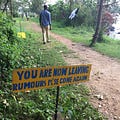



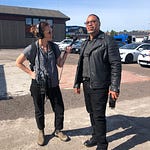
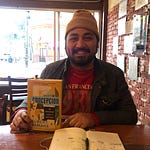



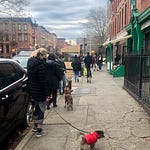
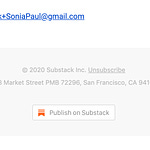
Loitering on the Phone with Rachel Monroe